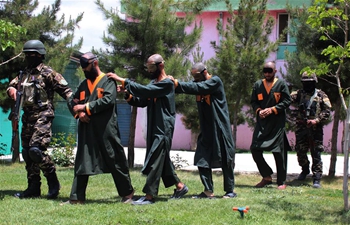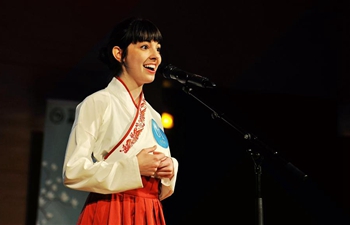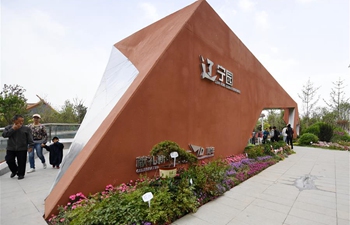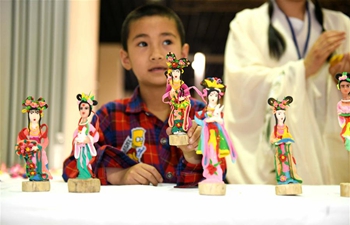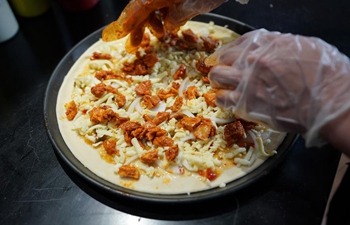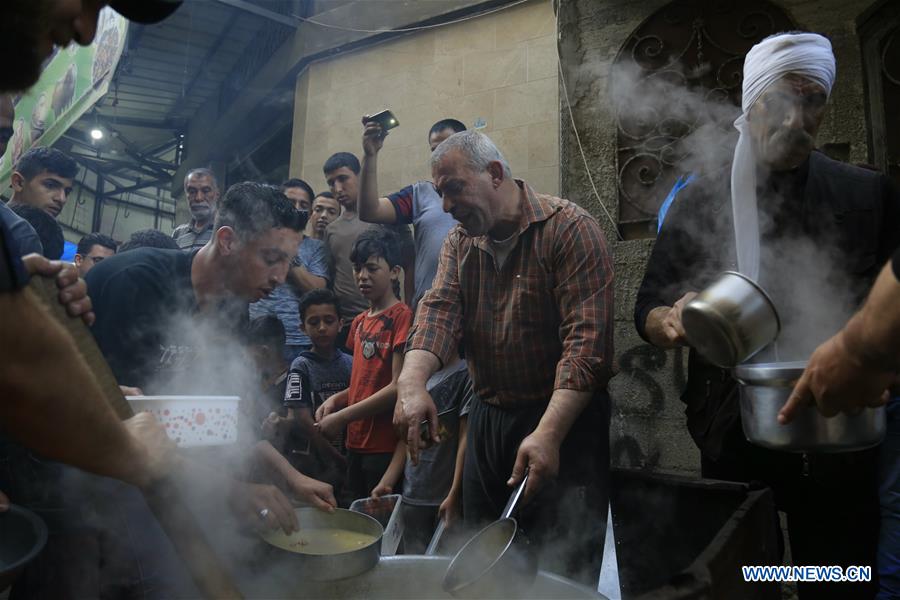 ?
?Palestinian man Walid al-Hattab distributes soup to poor locals in the Islamic holy month of Ramadan in Gaza City, on May 20, 2019. For the third year in a row, Walid al-Hattab, who cooks Palestinian soup called "Garisha," is trying to spread the Palestinian tekiya, a tradition cooking for poor people for free, in the Gaza Strip. Al-Hattab cooks the soup in the street where he is based in and invites people to get their food freely. "Tekiya is a Palestinian tradition. We grew up and saw our parents following this habit throughout the past years, especially when the Palestinian people faced tough conditions," al-Hattab told Xinhua. (Xinhua/Stringer)
GAZA, May 20 (Xinhua) -- For the third year in a row, Walid al-Hattab, who cooks Palestinian soup called "Garisha," is trying to spread the Palestinian tekiya, a tradition cooking for poor people freely, in the Gaza Strip.
The "Garisha" soup's ingredients are minced wheat, beef or lamb meat and onions.
Al-Hattab cooks the soup in the street where he is based in and invites people to get their food freely.
"Tekiya is a Palestinian tradition. We grew up and saw our parents following this habit throughout the past years, especially when the Palestinian people faced tough conditions," al-Hattab told Xinhua.
He added that while he was serving the soup in the bowl by using a ladle, he thought that "we are not hungers in the Gaza strip. We only live in tough conditions as a result of the Israeli blockade, the continued wars and the Palestinian division."
Al-Hattab, who lives in eastern Gaza city, believes that he can help his neighbors to get their food freely without insulting them.
"Every day, we feed about 130 families and the average number of each family are 5 people," al-Hattab said.
"Most of the Palestinian people live under the poverty line because of the political conditions that affected negatively on the people's lives," he added.
In February, a report released by the Palestinian Central Bureau of Statistics showed that the unemployment rate in the Gaza Strip reached 52 percent in 2018 compared with 44 percent in 2017.
The report also revealed that about 85 percent of the people in the Gaza Strip live under the poverty line, most of them live on food aids provided by the international donor institutions.
Israel imposed a tight blockade on the Gaza Strip right after Islamic Hamas movement violently seized control of the enclave in 2007. Since then, the economy in the Gaza Strip has been deteriorating with a hard living situation for its people.
Meanwhile, the Palestinian Authority (PA) led by President Mahmoud Abbas imposed sanctions on the Gaza Strip after the failure of Palestinian reconciliation efforts.
About 50 percent of the salaries of the PA's employees were deducted, which led to the rise in the poverty rates, economic experts told Xinhua.
"We are not here to solve the economic problems ... but to help ourselves to restore our social unity," al-Hattab said.
"Gaza was a commercial corridor where traders used to stay for a rest and the residents used to do the tekiya to feed the passers-by," an elder man who was sitting in a chair near the bowl of the soup, told the young men who surrounded him.
Zeina, 14, told Xinhua that she lives in a poor family, and they fail to find the normal food most of the days.
"My family and I do not eat the meat at most, so I came here to get the soup and let my young brothers to eat the meat," she said while holding her small bowl and waiting for the soup.





